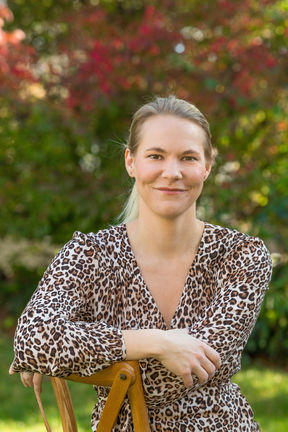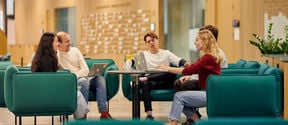Department of Finance
The Department of Finance at Aalto University School of Business is one of the leading finance departments in Europe.

Who are you? What did you study at the School of Business and when did you graduate?
I'm Riikka Davidkin. I studied at the School of Business in 2004–2009 with a major in finance and a minor in economics and quantitative methods.
What was your dream job when you were young? What do you think influenced these dreams?
I remember dreaming of being a manager and having a career in trade. I thought of what it would be like to be the manager of Stockmann, for example, or manage the trading activities of an airport. I was also interested in an international career. As a teenager, I spent a year in California with my family, and since then, I've felt that there are opportunities also for me outside Finland.
On the other hand, I have always been interested in social issues and having an impact. I remember a course in economics in general upper secondary where we discussed economic policy and its impact on people's everyday lives. It was one of my favourites.
What kind of work experience did you gain while studying? And how have hobbies or other leisure activities affected your working life skills?
I didn't follow a 'typical' traineeship path in consulting houses and M&A/investment banks like many others did. As my studies progressed, I became more and more interested in the quantitative side of finance (while many preferred corporate finance); I liked to study the currency and commodity markets, so I ended up working in the Treasury team of a copper company bought from Outokumpu by a venture capitalist. We managed a large debt portfolio in the bond market as well as commodity and currency hedging.
Studies at the School of Business are a good window to see different career paths in practice. But on the other hand, I'd never have guessed where my career path takes me in the first 10–15 years, so I wouldn't stress too much about it. Hobbies and free time are a key part of studies, because although I have changed jobs and even continents, my best friends – many of whom are from the School of Business – have remained and become even more important over the years!
Would you do something different in your studies?
If I could relive my time at the university, I would make better use of the opportunity to do internships at different companies and meet different employers at fairs and events. I realised it later as an employer how rewarding student cooperation is also for companies, and how great asset it is for the students at the School of Business compared to many other higher education institutions in Finland.
School of Business alumna Riikka DavidkinThe one thing I have tried to change in every organisation I have worked at is the unnecessary glorification of long working days.
What would you like to change in working life?
Reconciling family life and work is an eternal challenge, also in the financial sector, which many find demanding in terms of working hours. The one thing I have tried to change in every organisation I have worked at is the unnecessary glorification of long working days. If you want to do a good job and succeed, I think you need to push yourself at times no matter where you work, but it is often up to the management to decide how it plays out in practice.
Contrary to what I have been told (on several occasions) over the years, parents of young children – mothers and fathers alike – can work in the financial sector, as long as both sides want it. Luckily, it feels that paternity leaves, for example, have become more common since I had my first child nine years ago. I believe that this has changed and will continue to change the culture of the financial sector for the better.

How has your career path been?
As I mentioned, I was very interested in quantitative macro-financial market issues, such as currency and commodity markets, during my studies. After the School of Business, I ended up on the trading floor of Nordea, first at the macro research department and then as a bond analyst. As a result, I became more interested in corporate financing, as I investigated the credit risk of large companies issuing Finnish bonds.
I was also able to meet many institutional investors both in the Nordic countries and more widely in Europe, which was very interesting. I spent over 10 years at Nordea. It was a great place to work because, in addition to interesting tasks, it was easy to move from one task to another within the company. I also had three kids during that period, and if I remember correctly, my tasks changed (for the better) after every parental leave! For a few years, I worked on internal strategy with the head of Nordea's major client unit, and my last position was to head the debt origination team of the Finnish major client function. In practice, my team structured and originated debt packages for Finnish companies, for example for corporate acquisitions or large investments.
During my time at Nordea, I also grew interested in the sustainability of financial markets. Nordea was one of the pioneering banks in this area years ago, and my team made a lot of green and sustainable debt packages for large corporations. The idea of leveraging the financial markets to achieve environmental and social objectives grew stronger and stronger, and eventually I realised that I wanted to take this thinking even further in my career.
Around the same time, our family had the opportunity to move to New York, and I decided to make the most of the situation, as I knew that the charity sector in America was huge and that it is used to support and catalyse various impact investing innovations. After moving to New York, I studied the topic more at a local university.
In New York, I first ended up at the Impact Fund for Children at UNICEF USA, which, like the name implies, strives to leverage the financial markets for the benefit of children with both donation and investment funds. In less than a year, I was offered a position at Social Finance. They have developed and introduced various financial products in the U.S., the idea being that investors take a risk to achieve the agreed social or environmental objectives. In other words, they will only get their money back and return on investment if the impact objectives are met. I'm now running a team at Social Finance that invests in various impact funds with the aim of scaling this so-called 'impact first' investment market in America.
School of Business alumna Riikka DavidkinHiring new, often young, people and pushing them forward in their careers is one of the best parts of my work.
What does your work at Social Finance involve?
My team at Social Finance runs a fund that invests in early-stage impact funds. So a part of my work relates to finding and investing in the best impact funds. Typically, my team carries out due diligence on a few funds at a time, and my role is to manage the deal teams that do research. I also attend a lot of conferences of the field and meet portfolio managers of different funds, which is always exciting.
The other part is connected to growing our own fund, so meeting investors/donors. The work is very interesting. I've been able to meet a wide variety of large and smaller foundations and have learned a great deal about American social structures, problems and opportunities.
A large part of my work is, of course, team management. Hiring new, often young, people and pushing them forward in their careers is one of the best parts of my work. I believe that organisations like Social Finance are attracting a particularly wonderful group of people – smart, talented people, typically from top universities in the U.S., who also want to leave a better world behind for everyone. I absorb a lot of energy from my colleagues and learn from them all the time.
How is impact present in your work? What good can a degree in finance do?
Impact is at the heart of my work. We do nothing if it cannot have a positive impact in society or communities/environment in the first place. The funds we invest in promote, for example, wealth creation in poor areas through home ownership or bring innovations that mitigate the impact of climate change to communities that wouldn't otherwise have access to them.
Our investments often leverage funding from both the public sector and private investors. I personally don't believe that either side alone can solve the big problems of our time, so we need financial actors and innovation to bring them together. The financial sector drives capital, so I cannot think of many sectors that are better positioned to have an impact. I'm super happy that I ended up in this field and career path.
Read more about Riikka's career path and studies on LinkedIn!

The Department of Finance at Aalto University School of Business is one of the leading finance departments in Europe.

Here you can find School of Business alumni stories. Our alumni share their professional journeys and give advice and tips regarding working life. The stories have been sorted based on the alumni's majors. The newest publications are placed first in the major groups.

Aalto University School of Business Career Services offer a wide range of services to our students.



